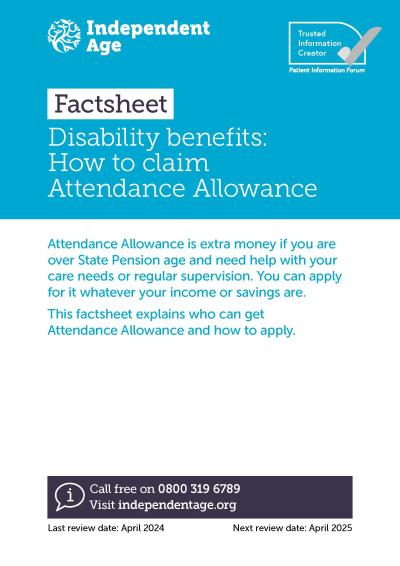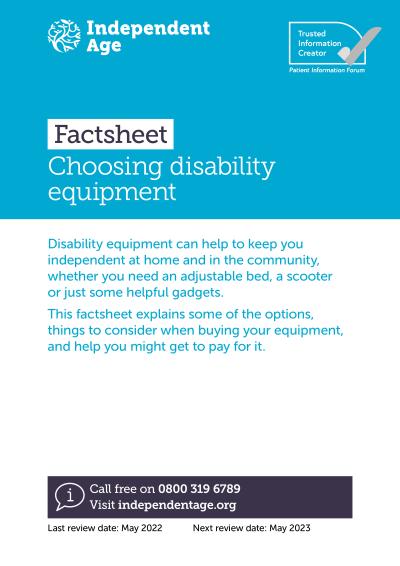Related publications

Disability benefits: How to claim Attendance Allowance

If you’re under State Pension age and have a long-term health condition or a disability, you could get extra money to support you. In England and Wales, you could qualify for Personal Independence Payment. If you live in Scotland, you could qualify for Adult Disability Payment. These benefits are not means-tested.
Personal Independence Payment (PIP) is available to people over 16 and under State Pension age living in England and Wales. You may qualify if you have difficulties with daily activities and/or mobility because of a disability or long-term physical or mental health condition.
There are two parts to PIP:
For a full list of what counts towards each part, visit Citizens Advice or Gov.uk.
When you are assessed, you will receive points for each daily living activity and each mobility component depending on how well you can manage and how much help you need. These points will help the DWP work out how much financial help you qualify for.
PIP is replacing DLA. Depending on when you were born, this change might effect your benefits – visit Gov.uk for more information.
If you’re receiving DLA, you shouldn't apply for PIP until you’re contacted by the DWP, because there’s no guarantee you’ll be awarded PIP, and you risk losing your DLA.
If you want to claim PIP before you're invited, get advice first. If you’re under State Pension Age, contact your local Citizens Advice.
For advice if you’re over State Pension Age, call our Helpline on 0800 319 6789.
Call the PIP new claims helpline. In some areas you can start a claim online. You can also apply by post by writing to:
Personal Independence Payment New Claims
Post Handling Site B
Wolverhampton
WV99 1AH
For tips on filling in the application form, visit Turn2Us or Citizens Advice. If you need help completing the application form, preparing for assessments or challenging a decision, contact Citizens Advice or Gov.uk.
Once your claim form has been reviewed, you may have to have an assessment – this could be face to face, over the phone or via a video call. Citizens Advice has a useful guide to help you prepare for an assessment.
The DWP will write to you to let you know the outcome of your claim and, if successful, how much you have been awarded for the Daily Living and Mobility components. How much you can get depends on how many points you score – visit Gov.uk for more information.
If you’re turned down for PIP, you have one month to challenge the decision from the date on the decision letter. For more information, see our factsheet What to do if you disagree with a benefits decision.
Adult Disability Payment (ADP) has replaced Personal Independence Payment (PIP) and some Disability Living Allowance (DLA) claims in Scotland.
If you already receive PIP from the Department for Work and Pensions (DWP), you do not need to apply for ADP because your benefit will be moved automatically.
If you already receive DLA, your date of birth will determine what happens to your payment – visit Mygov.scot for more information. No matter your date of birth, there should be no gaps in your payment.
You may qualify for Adult Disability Payment (ADP) if you have a terminal illness or if you have difficulties with daily activities and/or mobility because of a disability or long-term health condition.
Similar to PIP, ADP has two parts:
For full details of what counts as a daily activity or part of the mobility component, visit mygov.scot.
Call Social Security Scotland. An adviser will ask you for some basic details and fill in the first part of the application form over the phone with you. If you meet the basic eligibility criteria, you will be sent the second part of the application form.
You can also apply online at mygov.scot. When you fill in the form, either online or by paper, give as much detail as you can about how your condition affects you. For tips on filling in the application form, visit Citizens Advice or Mygov.scot.
If you need help completing the application form, an adviser from Social Security Scotland’s local service can come to your home. Call Social Security Scotland or contact Citizens Advice Scotland to learn more.
After you apply, Social Security Scotland may contact you for more information or to ask you to take part in a consultation.
Social Security Scotland will send you a letter called a notice of determination with the decision about your application. Your decision letter will tell you if your claim has been successful, and if successful, how much you have been awarded for the Daily Living and Mobility components. Your claim may be turned down, or you could be awarded one component or awarded both components.
If you’ve been told you may have 12 months or less to live, your claim will be processed more quickly and you will only need to complete certain parts of the application process. You will also be able to do it over the phone, rather than in person.
There are two different rates for each component. You may be able to receive one or both components, depending on how many points you score in your assessment. To see how much you’ll get, visit:
If you have a life-limiting illness, you’ll automatically qualify for the higher daily living rate.
If you’re awarded the mobility component for either PIP or ADP, it could also unlock other benefits such as a free bus pass, a Blue Badge to help with parking, and the ability to lease mobility equipment.
For more information about additional benefits when receiving the mobility component for PIP, visit Gov.uk.

Call the PIP new claims helpline to start your application for PIP.
Call Social Security Scotland to start your application for ADP.
If you’re over State Pension age and still receiving one of the disability benefits mentioned in this webpage, contact our Helpline.